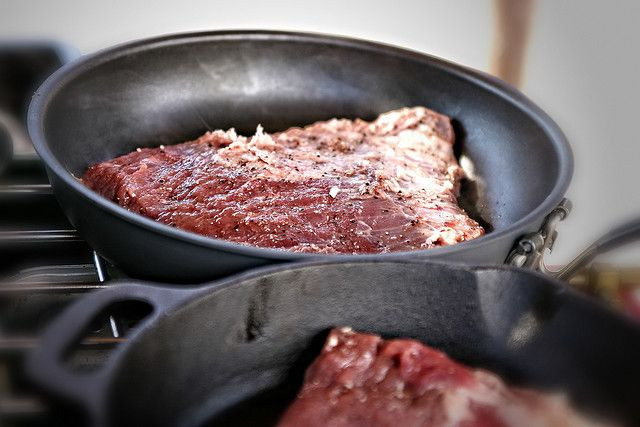Your Hamburger May Have Feces Inside of It

Margaret Lamkin is now 90 years old. She does not visit her grandchildren much these days, she never flies, and she constantly worries about infection. That is because three years ago, Lamkin was ravaged with a pathogen that destroyed her colon and nearly killed her. She has to wear a colostomy bag for the rest of her life - all because of a medium-rare steak she ate at the casual dining restaurant Applebee's.
For many people, the epitome of a good meal is a nice steak. However, according to a new report, you may want to be careful about eating steak medium-rare - or even heating it up further. The report states that many large beef providers conduct a process called mechanical tenderization, which prods the meat with blades in order to cut through the tissue and muscle fibers and make the meat less tough. The process may be pushing E. coli and fecal matter to the middle of the meat and could be responsible for sickening at least 100 people between 2000 and 2009.
The bacteria E. coli lives primarily on the surface of the meat, which is why it is generally safe to eat rare meat where the inside is practically uncooked. However, mechanically tenderizing the meat pushes the bacteria inside the surface. What's worse is that the meat is unlabeled, so consumers, grocery stores, restaurants, and distributors do not know what they are getting. Even well-cooked, one report says that bacteria can hang out in cold spots even when ground meat is cooked to 160 degrees Fahrenheit and intact cuts are cooked to 145 degrees Fahrenheit. Though, according to a 2008 USDA survey, 90 percent of beef producers used the process on at least some of their cuts, they are not required to label their meat as such. In fact, the beef industry says that there is no problem. They say that E. coli infection has gone down among all beef sources between 2000 and 2011.
E. coli is not the only problem. When Tyson's beef plants were inspected by federal workers, they noted "a piece of trimmed fat approximately 14 inches long with feces the length of it". That mean that fecal matter inside beef could be subject to mechanical tenderization as well. Tyson says that they have since repaired their system, adding more employees to cut down the level of fecal contamination.
Even more concerningly, many worry about the use of antibiotics in meat. Many large suppliers provide antibiotics to cows in a precautionary measure to avoid sickness in their livestock, but some say that this practice has made antibiotics useless in the face of bacteria. Congresswoman Louise Slaughter wrote a report on this subject earlier this year.
The United States is the largest producer of beef in the world and ships it worldwide.



























